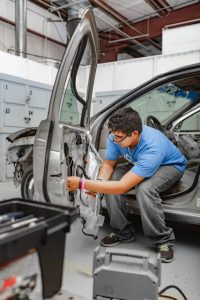(WACO, Texas) – Texas State Technical College has been selected as one of four colleges nationally to take part in a program aimed at producing more workers for the automotive collision repair industry.
Enterprise Holdings, with funding from its philanthropic arm the Enterprise Rent-A-Car Foundation, and Missouri-based Ranken Technical College have launched the Automotive Collision Engineering Pilot Program. The program includes that college, TSTC, and institutions in California and Illinois.
The pilot program’s purpose is to have students get real-world experience as they learn in classes to go into the collision repair industry. Jobs for auto body and glass repairers is projected to be at 184,000 by 2029, according to the U.S. Bureau of Labor Statistics. In Texas, workers are reported to make an annual mean wage of $36,960.
“We’re proud to be spearheading the Automotive Collision Engineering Pilot Program through this innovative pilot,” said Mary Mahoney, vice president of Enterprise Holdings’ Insurance Replacement Division. “As the world’s largest car rental provider and an industry leader in mobility and technology, we have a huge stake in the health of the automotive repair industry and are committed to doing our part to invest in its success.”
The pilot program is using a model that Ranken Technical College has developed to provide apprenticeships to collision repair students. TSTC’s Auto Collision and Management Technology program will follow this format.
Students starting this fall in TSTC’s Auto Collision and Management Technology program are eligible to join the apprenticeship program. Students that meet program requirements throughout their time at TSTC will earn the Associate of Applied Science degree in Auto Collision and Management Technology – Repair Specialization Co-op. Some of the topics that students will learn include automotive plastic and sheet molded compound repair, collision repair welding, estimating, structural analysis and vehicle hardware.
“This program is for someone who really wants to do this,” said Jannifer Stimmel, an instructor in TSTC’s Auto Collision and Management Technology program. “We are aiming for a very special kind of student. We want someone who is motivated and driven.”
Students accepted into the program will take seven weeks of classes and work at approved repair shops for seven weeks each semester. Stimmel and the students will select the best place to work, but she will visit to make sure the repair shop has the right equipment and a technician who can mentor.
She said it will help if shops are part of the Ford Certified Collision Network. Shop staff need to keep journals each week for Stimmel to review students’ progress. A portion of each student’s pay is subsidized by the pilot program.
“The goal is to have them work wherever they are planning on living when they graduate,” Stimmel said. “The ultimate goal is for them to be in a certified shop that can offer them an opportunity.”
The collision repair field is evolving for technicians who are becoming collision engineers.
“We are handed the instructions when a vehicle has been wrecked, and it is our job to put it back the way the manufacturer had it,” Stimmel said. “We are using procedures to re-engineer the vehicle and building it just like the factory does.”
Potential students interested in the pilot program can go to https://www.beacollisionengineer.com.
For more information on Texas State Technical College, go to tstc.edu.
